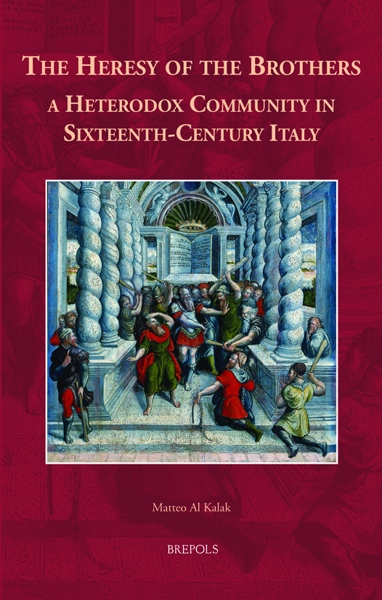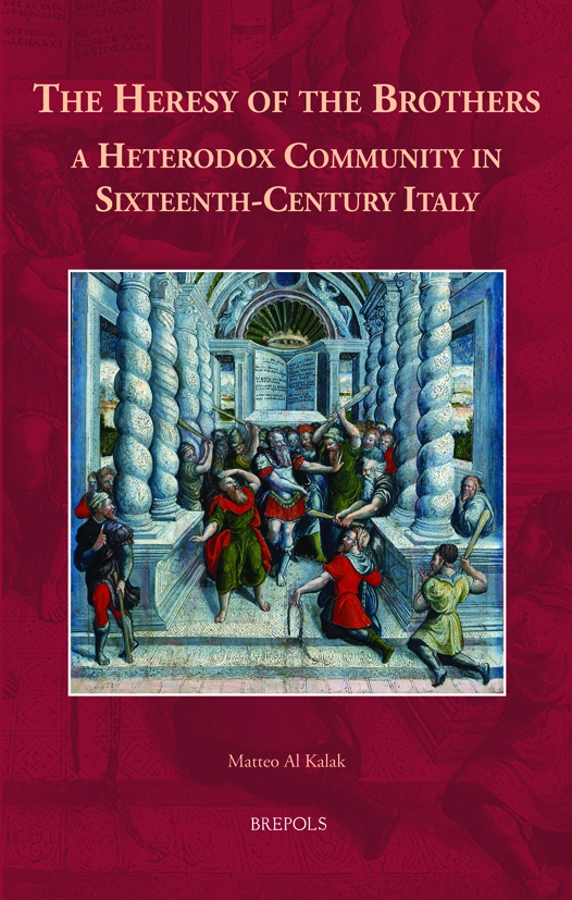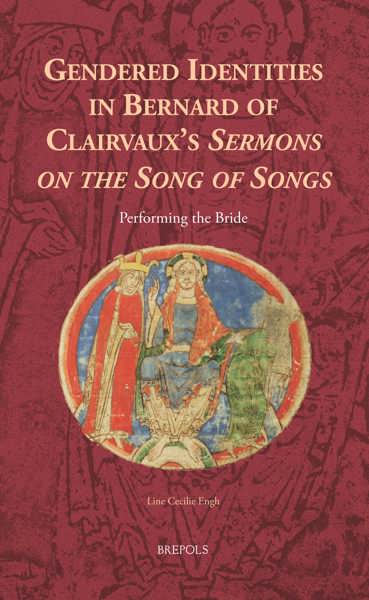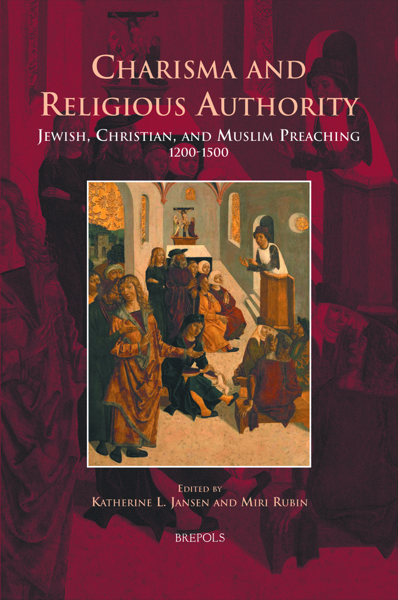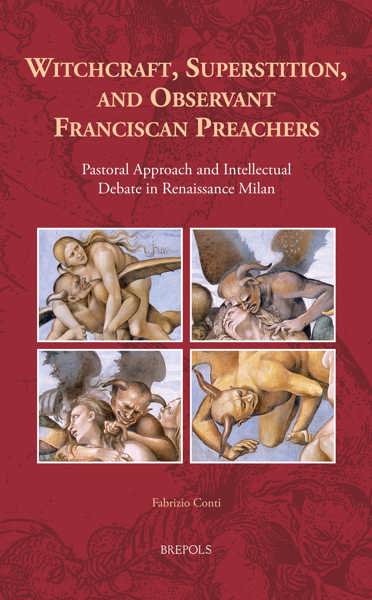
The Heresy of the Brothers, a Heterodox Community in Sixteenth-Century Italy
Matteo Al Kalak
- Pages: 221 p.
- Size:156 x 234 mm
- Illustrations:12 b/w, 8 col., 3 tables b/w.
- Language(s):English
- Publication Year:2022
- € 75,00 EXCL. VAT RETAIL PRICE
- ISBN: 978-2-503-59329-6
- Hardback
- Available
- € 75,00 EXCL. VAT RETAIL PRICE
- ISBN: 978-2-503-59330-2
- E-book
- Available
A study of one of the largest Italian heretical communities, that developed in the city of Modena in the sixteenth century.
“The recent monumental biography of Morone by Massimo Firpo and Germano Maifreda (Turin 2019) – the culmination of many studies by Firpo of a cardinal who had been one of the key protagonists of Italian religious reform – sets the wider field of interpretation within which Al Kalak’s picture furthers our understanding of Modena’s religious life. This is no small achievement, given the impalpable and fissiparous nature of Italian Protestant dissent in the sixteenth century.” (SIMONE MAGHENZANI, in Journal of Ecclesiastical History, 74, 2023, p. 186)
« L’ouvrage se lit aisément (…). Il est de belle présentation. Les documents mis en annexe sont utiles, notamment les procès-verbaux des interrogatoires en latin avec traduction anglaise, une lettre de l’inquisiteur de Modène à son collègue de Ferrare, celle du Conseil de ville au duc et celle du gouverneur de la ville à la duchesse (italien/anglais). L’index des noms propres (personnes et lieux) est également bienvenu. En somme une recherche méritoire au résultat adapté. » (Gabriel Audisio, dans Revue de l’histoire des religions, 1, 2024)
"La tradizione di studi sull’eresia nella penisola italiana si arricchisce di un contributo molto importante con questo studio di M. A. K. che potrà, grazie alla traduzione in inglese, essere letto da molti più studiosi ed essere base di partenza per altre ricerche. In appendice sono pubblicate le traduzioni di alcuni documenti, una scelta lungimirante per avvicinare alla ricerca d’archivio e per consentire una lettura diretta delle fonti." (Michaela Valente, in Revue d'Histoire Ecclésiastique, 119/1-2, 2024, p. 399)
"Matteo Al Kalak has provided us with a compelling narrative that complements our understanding of early modern religious dissent and sheds new light on the nature and scope of the European reformations." (Thomas A. Fudge, in Parergon, 42/1, 2025, p. 199)
Matteo Al Kalak is Assistant Professor of the History of Christianity and of the Churches at the University of Modena and Reggio Emilia. He has conducted research on religious history with particular attention to the religious non-conformism. His publications include various monographs and scientific articles on the Inquisition, the Council of Trent, and the confraternities between the Middle Ages and the Modern Age.
Around the mid-sixteenth century, one of the largest Italian heterodox communities developed in Modena: the community of ‘Brothers’. At the beginning of the century, a flourishing humanistic tradition had inspired protests against the authority of the Church and had led many of the city’s prominent figures to sympathize with Luther and the Reformation. Over the following decades, such positions became more extreme: most of the ‘Brothers’ held radical convictions, ranging from belief in predestination to contestation of the Antichrist pope. In some cases, the ‘Brothers’ even went so far as to deny the value of baptism.
This heterodox community in Modena created a hidden network for the free expression of its reformed faith. Within twenty years, however, the election of Pope Pius V (1566–1572) and the consolidation of the Holy Office led to a harsh campaign to disperse dissenters in the city. Despite the protection of illustrious members of the Roman Catholic hierarchy, the bishops of Modena, and the dukes of Ferrara, the Holy Office succeeded in repressing the community. The history of the ‘Brothers’ of Modena therefore provides a case study for understanding how the Inquisition influenced the balance of religious Italy, changing the face of the Peninsula forever.
Abbreviations, List of Illustrations Introduction
Chapter 1. The Face of Heresy: Protagonists and Scenarios of Dissent
- The context: a city in sixteenth-century Italy
- From the Academy to the ‘Brothers’: two generations
- Faith and commerce: the structure and places of heresy
- Private meetings and public protests: secrets, uproar and the spread of the community
- The leaders of the ‘sect’: hierarchies, welfare and roles in the heterodox movement
- The origins of the community: Camillo Renato, Bartolomeo Fonzio and Bartolomeo della Pergola
- The conduct of bishops in the face of religious dissent
- The trials conducted by the Inquisition (1546–1568)
- The final dispersion of the community (1568–1570)
- Conflicts between the political authorities and the courts of faith: the defence of municipal autonomy
- Impossible compromises: Community, Court and Inquisition
- The final defeat: the Magnavacca case
- From Bible translations to Erasmus of Rotterdam
- Satires, catechisms and anti-Catholic pamphlets
- Methods of circulating, distributing and concealing forbidden books
- Saving the soul: justification, free will and predestination
- Criticism of baptism and the spread of antitrinitarian doctrines
- Signs of God: eucharistic symbolism and celebration of the Lord’s Supper
- Confessing sins
- Papist inventions: priesthood, confirmation, extreme unction and marriage
- Prayers for the living, prayers for the dead
- The worship of saints and images
- Fighting the Antichrist
- Feeling persecuted: inquisitorial repression and expectations of freedom *
- Pursuing heresy: outlying territories
- Monitoring affections: family networks
- Beyond the border: inquisitorial networks against the Brothers
Appendix I. Series of Bishops of Modena, Roman Pontiffs, and Dukes of Ferrara
Appendix II. Documents
Works Cited
Index
